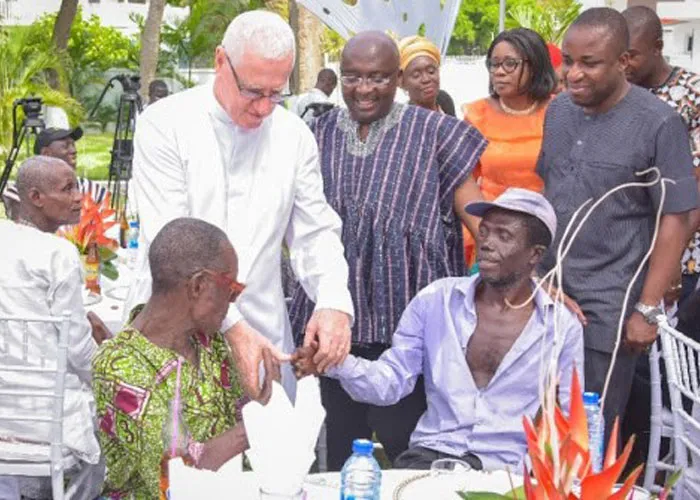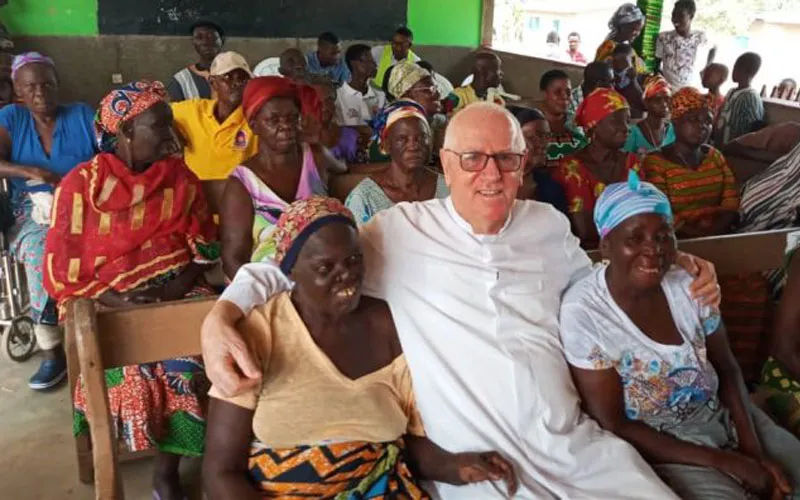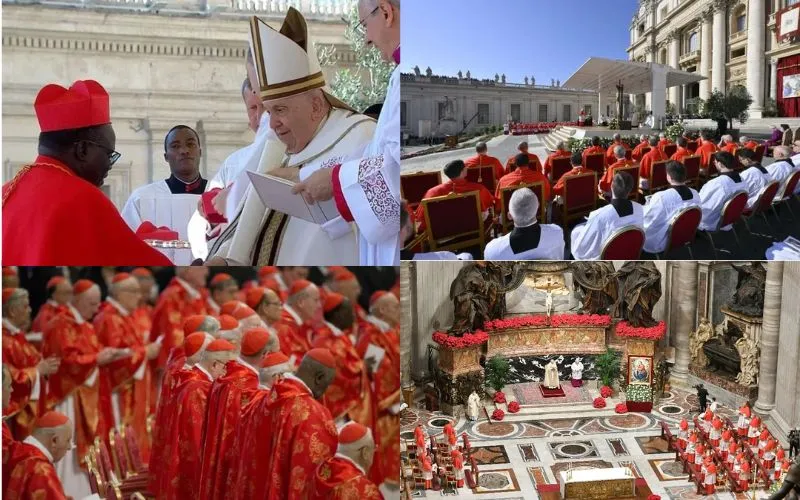In the years that followed, Fr. Campbell notes that he began to take an active interest in the plight of these people, and he noticed how they were treated, even by medical staff at the hospitals.
“I have heard horrendous stories about the way they have been shunned and treated badly by nurses. If medical staff react in this way, it is not surprising that the general public should display even greater ignorance,” the Irish Priest says.
He recounts: “I saw one case sometime back and I had never encountered in my life before. This woman had been kept in her village and her family had not brought her for medical attention because of the stigma attached to the disease. She was in a most awful condition. This is such a pity because if the leprosy is caught in the early stages, it might only be affecting a small patch of skin.”
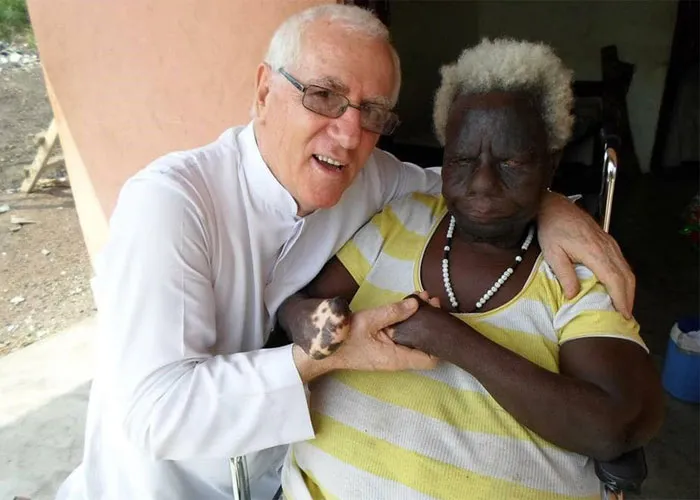
Fr. Campbell, the Parish Priest of Christ the King Church who has lived in Ghana since 1971 has been honored as a less-celebrated person who has touched lives of many victims of societal discrimination against leprosy and changed how people with the disease are treated.
(Story continues below)
While delivering a statement on the floor of Ghana’s Parliament House on the call to action to end discrimination against persons with leprosy to mark the 2020 World Leprosy Day on January 26, Dr. Zanetor Agyeman-Rawlings, Member of Parliament for Korley Klottey Constituency hailed Fr. Campbell for his efforts in fighting against stigmatization of lepers, saying that “he deserves special recognition and mention for devoting his life to showing love and care for persons with leprosy.”
“Fr. Campbell’s selflessness, love, care and advocacy has contributed significantly to improving the lot of people living with leprosy in Ghana,” Dr. Zanetor noted, adding, “If Fr. Campbell and the LAC can do so much to alleviate the plight of cured lepers, then as a nation we can do more.”
According to the MP who belongs to the main opposition party in Ghana, one of the main challenges confronting persons with leprosy is stigmatization and discrimination, saying that they are marginalized and treated with scorn within their communities. This, she said, leads to situations where the disease goes unreported and people refusing to seek early treatment for fear of being marginalized.
Dr. Zanetor noted that although there has been a marked improvement in the treatment and support for persons with leprosy, a lot more needs to be done to improve their living conditions.
She said despite the increase in the daily feeding fee for lepers to GHc1.00 (US$0.2), with the trying economic conditions in the country, the amount was woefully inadequate and suggested the review of the figure “to reflect the current economic situation and to alleviate the plight of our brothers and sisters with leprosy.”
The main focus of Fr. Campbell’s social work has been the support to the inmates of Weija Cured Lepers Rehabilitation Centre and other Leprosaria in the country.
Although cured of the disease, the men and women who live in these isolated facilities bear the signs of its mutilations and as a result have over the years been shunned by society. But bit by bit, fear has given way to a more charitable and enlightened attitude.
He is of the opinion that such integration would complement and add value to work going on at the leprosarium where fine efforts are being made to cure lepers.
“If society continues to reject the healed lepers, it has far reaching consequences on what is going on at the leprosarium. Let us remove the stigmatization the lepers go through,” Fr. Campbell told ACI Africa.
The Irish priest occasionally holds awards night where individuals and organizations that have helped the Committee are honored in events that are hosted at the leprosarium.
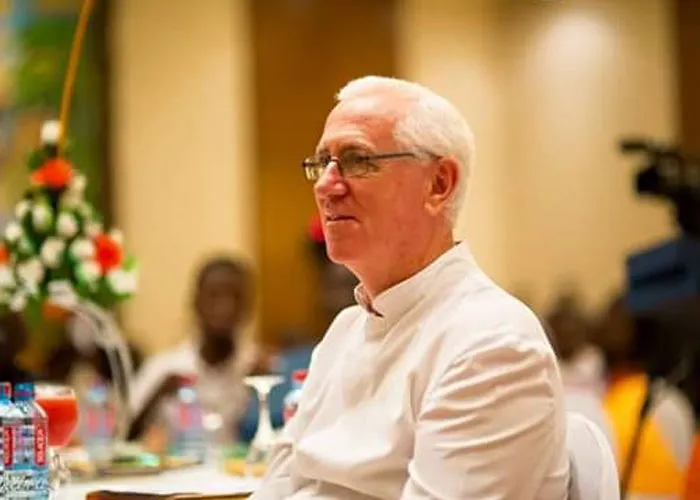
Fr. Campbell assures organizations supporting the cured lepers’ project that their monies and contributions would be used to improve the living standards of the inmates.
He said the Committee took full responsibility for the Weija Leprosarium, adding it had supported in the past the Ho, Nkanchina, Kokofu, Anindado and Ahontokrom Leprosaria in Ghana.
Fr. Campbell expresses concern that lepers are treated like third class citizens, and describes the act “a terrible thing.”
“These people have rights and have to be taken care of,” he states, adding, "These people have to be treated with dignity. The notion that once a leper is always a leper is not true.”
Like the Biblical lepers who were segregated by society and forced to wear bells to warn people that they had the skin disease which was considered highly contagious, lepers are still shunned in most African countries, with those who have been cured in Ghana being forced to stay away in isolated homes, a situation that Fr. Campbell bemoans.
Faced with the challenges of getting more people to support activities of lepers, Fr. Campbell believes that some adjustments can be made in the state subsidy to lepers and that charitable donations and fundraising have to be more forthcoming to help.
When asked why the lepers are so close to his heart, he answers without hesitation, “If you are ever feeling down and out and you go to see the lepers, you will come back a different person. They have so much hope and they are grateful for the little they have materially. I see them as a sign of hope and encouragement, a blessing for our society. They are our treasure because they bring out the good in other people.”
The Irish religious cleric has been in Ghana for over 49 years, acquiring the name Nii Lantey over the years. Fr. Campbell says his role model is Mother Theresa and that he has adopted her renowned motto “Do Something Beautiful for God” as his source of strength.
